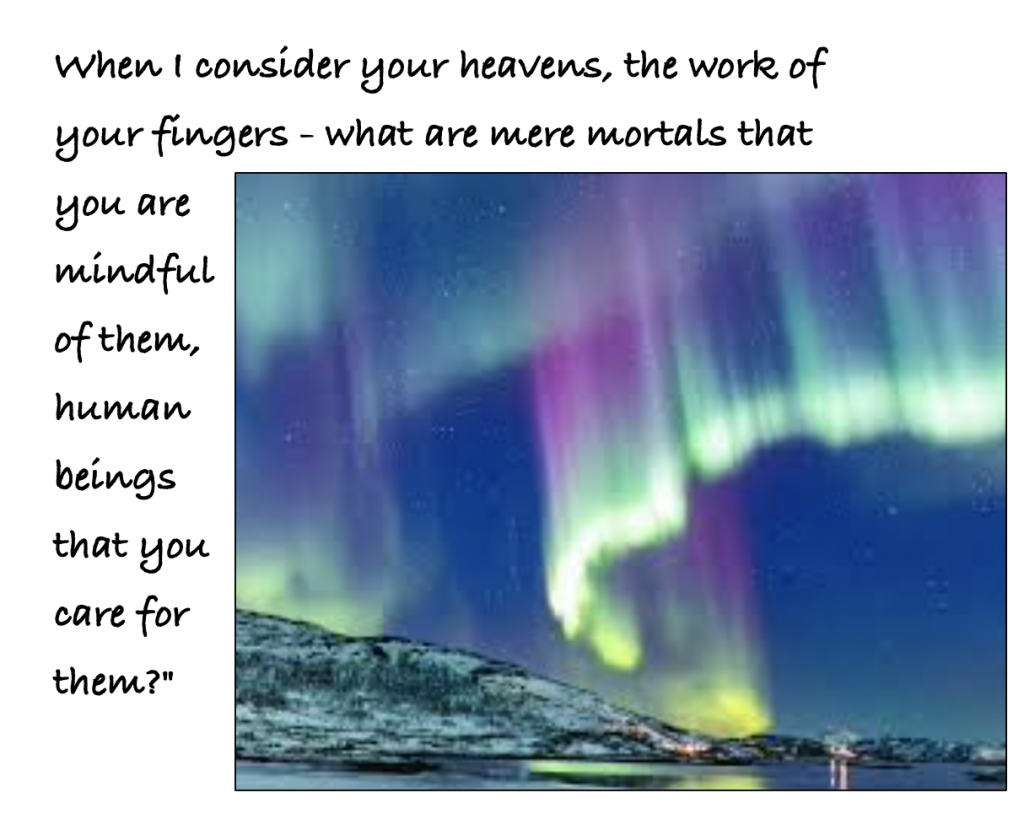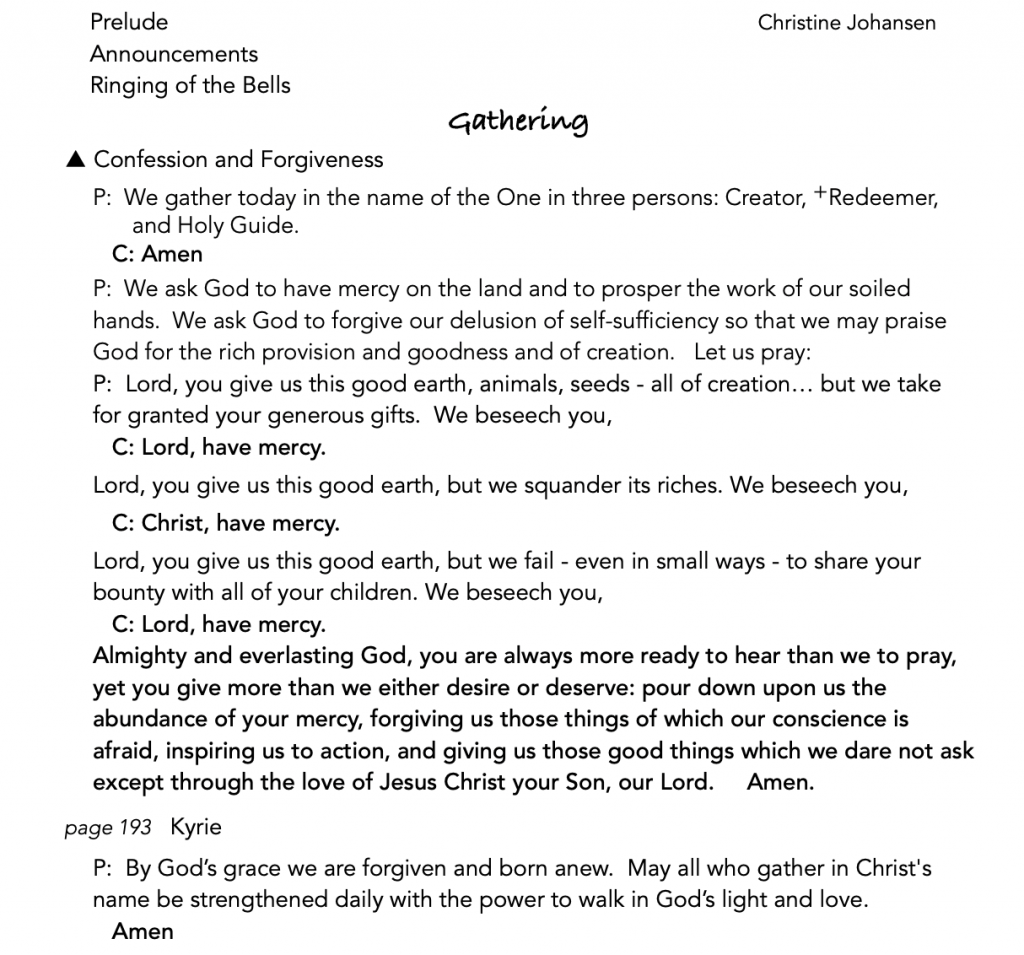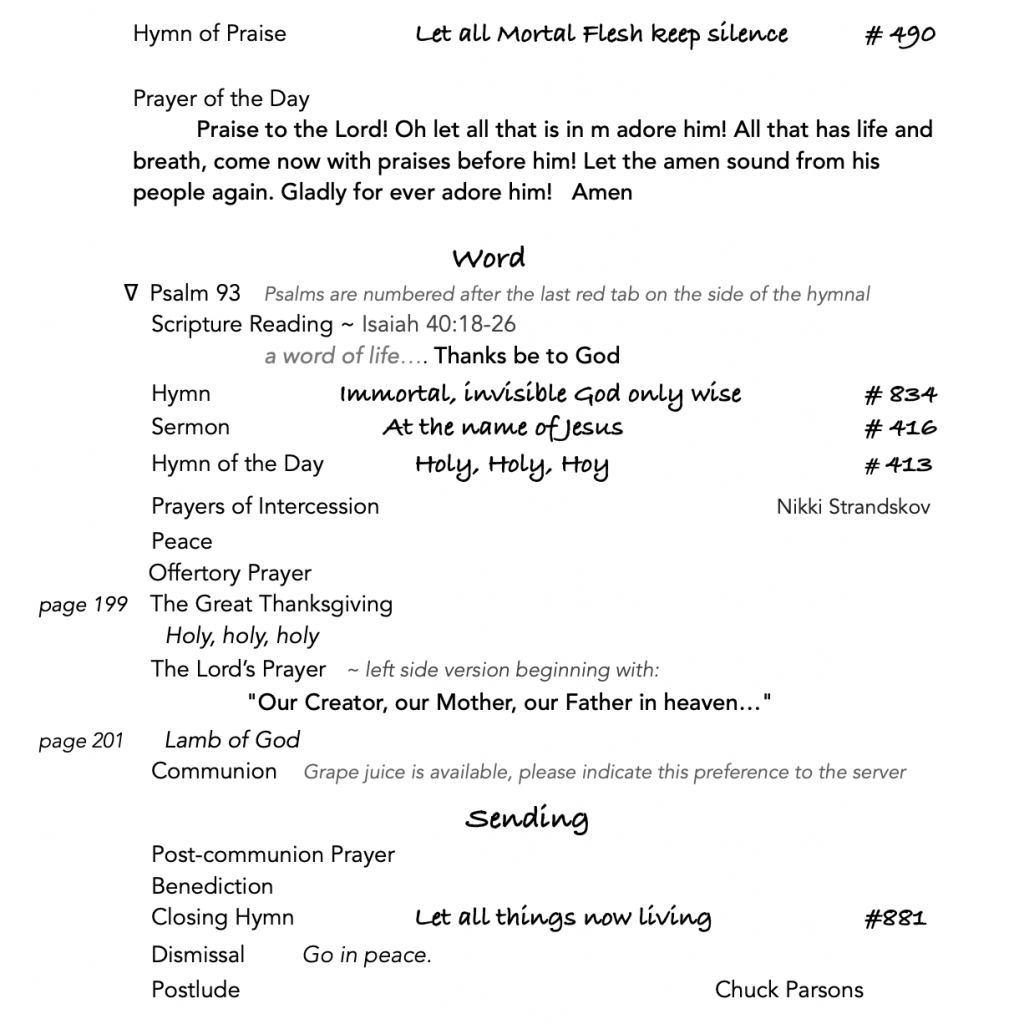


Today we begin a new series of sermon topics. In the past, I’ve preached on biblical images of God – shepherd, eagle, water, mother hen… I want to do something similar now, but in bigger categories. I want to look instead at the nature of God as presented in scripture and reflected in our hymnody. I’m introducing this in the announcements, because I want you to pay attention to the words you sing in all the hymns. I know from choir rehearsal that when we’re singing something new or not very familiar, all our attention is on the notes and we might not have any idea what words our mouths are forming, let alone make meaning from them. I think today’s hymns are familiar, so I’m asking you to think about what you’re saying and pay attention to the images that might come to mind as you sing.
#490 Let all mortal flesh keep silence
Thinking about the nature of God is an interesting topic to me, but I am a theology nerd – I know that. However, I think it might be important and interesting to normal people, too.
The way we think of God, the language we use, the motivations you might assign to God for things that happen in your life, the distance or closeness, the way in which we feel God acts in the world are all part of our personal spirituality – and determines or reflects (I’m not sure of the right word) how faith functions in any one of our lives.
I have organized these weeks spatially. Today, we begin somewhere beyond the universe. Imagine being outside on a clear winter night when starlight casts shadows on the snow. Looking up into the glimmering sky at all those stars and whirling galaxies in endless and expanding depth, filled with awe, you think, “God did that.” And you might echo psalm 8, “O Lord, our Sovereign, how majestic is your name in all the earth! When I consider your heavens, the work of your fingers – the moon and stars you have set in their courses, what are mere mortals that you are mindful of them, human beings that you care for them?”
That’s the God we are looking at today. The topic is Sovereignty.
The next topic will move in a bit closer – maybe to the level of rainbows spanning the earth and heavens, or the sun’s rays beaming down through a cloud as we consider the Transcendent, the hidden, but earthly experience of God. After that, we’ll consider Immanence – the indwelling nature of God, the closeness of God with us.
All of these aspects of divinity are found abundantly in the Bible – regarding both God and Jesus. There isn’t one that’s right, or better than the others, but they do have different implications for faith, and, as I said, for how it functions in your life – which is why it might get interesting.
The psalms are loaded with the language of the sovereignty of God. We will sing psalm 93 as a good example.
Scripture reading: Isaiah 40:18-26
18 To whom then will you liken God, or what likeness compare with him?
19 An idol? —A workman casts it, and a goldsmith overlays it with gold, and casts for it silver chains.
20 As a gift one chooses mulberry wood— wood that will not rot—then seeks out a skilled artisan to set up an image that will not topple.
21 Have you not known? Have you not heard? Has it not been told you from the beginning?
Have you not understood from the foundations of the earth?
22 It is he who sits above the circle of the earth, and its inhabitants are like grasshoppers;
who stretches out the heavens like a curtain, and spreads them like a tent to live in;
23 who brings princes to naught, and makes the rulers of the earth as nothing.
24 Scarcely are they planted, scarcely sown, scarcely has their stem taken root in the earth,
when he blows upon them, and they wither, and the tempest carries them off like stubble.
25 To whom then will you compare me, or who is my equal? says the Holy One.
26 Lift up your eyes on high and see: Who created these?
He who brings out their host and numbers them, calling them all by name;
because he is great in strength, mighty in power, not one is missing.
The sovereignty of God is the main difference that came out of the reformation between Martin Luther and the Lutheran tradition on one side, and the cluster of churches following John Calvin’s reform movement on the other side – Anglican, Presbyterian, Methodist, Baptist. For Calvin, God’s sovereign nature is the foremost attribute of the divine: the otherness, the power, wisdom, and might of God; the ordering of the universe, and predestination of all things from before the beginning of time. As sovereign, God is all-knowing, all-powerful, invisible, inaccessible – hid from our eyes. Let’s just sing it.
Hymn #834 is a classic definition of Sovereignty.
I picked out at least 10 hymns that demonstrate this facet of God’s being – we won’t sing them all – and I noticed that they are all hymns of praise and gratitude. Many are reworking of psalms. They are also mostly from the Reformed (or Calvinist) church tradition. Which makes sense. Calvin believed the psalms were the only faithful song form. They didn’t begin singing hymns until the mid to late 1700’s and even later in some denominations. So the hymns coming out of that movement would be about sovereignty. They are expansive, cool, clear, and distant. They are about eternity, Christ the King who is crowned with many crowns, victorious Lord of all. They speak of our soul’s upward longing, of God’s gracious provision. “Have you not seen all that is needful has been sent by God’s gracious ordaining? Ponder anew what the Almighty can do — if — with his love he befriend you.”
“If”. If?? Predestination was a big deal for Calvin. The Westminster Confession states:
“By the decree of God, for the manifestation of his glory, some men and angels are predestinated unto everlasting life, and others foreordained to everlasting death.
“…before the foundation of the world was laid, according to his eternal and immutable purpose, and by the secret counsel and good pleasure of his will,” …God chose some.
It continues in article VII: “The rest of mankind, God was pleased, according to the unsearchable counsel of his own will, whereby he extends or withholds mercy as he pleases, for the glory of his sovereign power over his creatures, to pass by, and to ordain them to dishonor and wrath for their sin, to the praise of his glorious justice.”
This is the Puritan, Anglican theology that formed our nation. People are predestined to salvation or damnation before the earth was formed. We can’t know what purpose that serves for God, nor can we tell one from the other by outer appearances. This preordained status can’t be changed or undone. It is part of the unsearchable, inscrutable will of God. You’re in or you’re out without any say in the matter.
One problem with this emphasis on God’s sovereignty is that it leads us to speculate about God’s hidden will, something that has not been revealed to us, rather than directing us to the ways in which God has revealed God’s self to us – through Word, Faith, compassionate human agency, the cross of Jesus Christ.
Martin Luther believed in God’s sovereignty, but that it showed itself in endless mercy. Lutherans confess that the Bible teaches God’s will is for all people to be saved, that salvation is solely through God’s action, and, that humans have the power to reject God’s offer. It’s a different form and feel of sovereignty.
I seem to have lost the reference for this quote. The article was comparing Lutheran and Calvinistic theology on just this point. I’m sorry I can’t credit it. “However it may have happened,” the author writes,”Calvinists became enamored with an appreciation of God’s sovereignty that is fundamentally flawed. They view God’s sovereignty as permeating all choices and all events persuasively and determinatively. In this way God’s sovereignty is a force in the universe that cannot be circumvented or refused. God “always gets his way the first time” because not only do all events occur under the domain of sovereignty but sovereignty determines that all events occur as exactly as they do. While it is true that all things occur under the domain of God’s sovereignty, it is false to assume that all things are therefore determined by God’s sovereignty. The reason is because the domain of God’s sovereignty includes genuine freedom.” ( * found it, see below)
Calvin did not believe in the freedom of human will. All things happen according to God’s will. As a biblical example, when in Isaiah 45, God is choosing the Persian king Cyrus to conquer Babylon and eventually free the Israelites from exile, he claims this.
“To Cyrus, whose right hand I have grasped to subdue nations before him and strip kings of their robes, to open doors before him—
For the sake of my servant Jacob, and Israel my chosen, I call you by your name, though you do not know me. I am the Lord, and there is no other. I form light and create darkness, I make weal and create woe; I the Lord do all these things.”
I grew up in Presbyterian and Methodist churches. I remember having conversations about predestination while washing dishes with my mom. It scared me as a young girl – it probably still does, because, even though I no longer believe that way, the fear that God didn’t love me was set as the default in my young understanding of God. Maybe I’ve become a pastor to learn myself out of my fear.
Let’s sing #416 At the name of Jesus. Notice the preordained, planned from the beginning of time, everything happens for a reason sense of calm. There was a plan, and it is all going to work out according to that plan. That is another tenant of Sovereignty.
There is one other feature of sovereignty that draws distinction between Reform and Lutheran traditions. In an article on What Lutherans Believe, the Rev. Aaron Simms reminds us “that it is God Himself who brings people to faith through the working of the Holy Spirit. So, even our faith is a work of God. To the question then, of why some people are not saved, even though Christ died for their sins and even though God wants them to be saved, Lutherans would answer, “We don’t know.” It’s a paradox that we don’t believe we can resolve. We often make a distinction between the “revealed God” – the aspects of God that we can know through scripture and by other means; and the “hidden God” – his hidden will that God does not show us. Lutherans believe that questions like why some people are saved and others are not, and why good people sometimes suffer and bad people sometimes prosper fall into this category of the “hidden God.” We can’t know or discover the answers through our own efforts, because God hasn’t told us the answers. In the end, then, we lean back on what God has clearly revealed to us and go from there.”
So instead of saying God willed disaster, illness, hardship, abuse or evil to happen in our lives as part of a predestined plan, Lutherans say, we can’t know the why, but we do know that God grieves in the scriptures, and that God in Christ promises to be with us in and through our suffering. And God’s Spirit works in and through our helpers to comfort and bring aid.
The questions I want to examine in each of these realms of God are what do we gain – and what do we loose if we see this topic as the primary definition of God?
In complete Sovereignty, we lose our sense of agency. If God does everything and wills everything that happens then why should we bother? This has led to much misery and allowed much evil to flourish. Lutherans, Reformed, Roman Catholics, non-religious are equally guilty of this, but you can see it in this theology.
If God will take care of it, then I don’t have to do anything. I don’t have to speak up, or step in, or offer my meager help, or change my behavior. God will see to it.
If it is by God’s will, then slavery (for example), or any exploitation of people and nature, must be fine, because it exists, therefore, it is part of God’s plan. The status quo is ordained and meant to be, or else God would change it. There is a pacifism that is dangerous — trusting too much in the absolute power and will of God negates inspired human agency. God’s will allows/is responsible for evil in this belief system.
What do we gain by accepting the sovereignty of God?
There is an overwhelming sense of awe and shifted perspective – it is not, actually, ‘all about us’ – which at times can feel very restful. “God’s got this,” in modern lingo. Looking into that night sky we gain a sense of majesty that lifts us above earth’s troubles. There is comfort in the fullness of all things, mystery in the things of God and the world that are only slowly revealed if at all. “Let go and let God” – God is in charge – not micromanaging the details, not countering the laws of nature to keep us safe, but God is all in all, and there is no other.
And obviously, we have gained beautiful hymns through the Calvinist, Anglican, Welsh, Scottish traditions. Grundtvig’s sovereign streak gave us Built on a Rock and The Word.
Let’s sing another sovereign classic, #413 Holy, holy, holy, Lord God almighty.
*Posted in Calvinism and Sovereignty | a theology in tension March 17, 2012 by StriderMTB